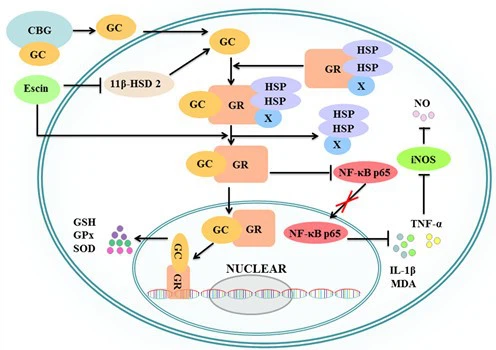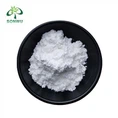Aescin
Escin powder, also known as aescin, is a natural compound found in the seeds of the Aesculus hippocastanum tree, commonly known as horse chestnut. It is known for its various medicinal properties and has been used in traditional medicine for centuries. One of the primary uses is to support vascular health. It is thought to possess anti-inflammatory and vasoprotective properties that can aid in reducing inflammation effect and enhancing blood circulation. It is frequently used for varicose veins, swollen legs, and leg pain, all signs of chronic venous insufficiency. Additionally, it is well known for its antioxidant qualities, which can aid in defending cells against harm brought on by free radicals.
Additionally, it has been studied for its potential anti-diseased cells, anti-edematous, and anti-inflammatory effects. Formally, it is used not only as raw material but also for topical use, often added to creams, gels, or lotions, to reduce facial swelling, dark circles, and skin inflammation. So if you need it, text Xi'an Sonwu; Xi'an Sonwu can provide you with pure escin.

What Is The Mechanism Of Action Of Escin
1. Anti-inflammatory mechanism
It was discovered that it could inhibit the release of high mobility group protein B1 from macrophages and reduce levels of TNF-, IL-1, and IL-6 in macrophages, which inhibits the activation of NF-B and increases the survival rate of mice when endotoxemia caused by lipopolysaccharide is studied. In addition, the antioxidant activity of it enhances its anti-inflammatory capabilities. It can increase the movements of myeloperoxidase, superoxide dismutase, and glutathione peroxidase and reduce serum NO, TNF-α, and IL-1β inflammatory factors. Level, improve the expression and function of glucocorticoid receptors, significantly reduce the degree of lung damage in endotoxemia mice, and extend their survival time. It can inhibit substantially the exudation of inflammatory tissues, reduce their permeability, and significantly affect edema and damage to various tissues.
2. Gastrointestinal protective mechanism
It can raise TNF-, P-selectin, and GSH-Px in gastric mucosal tissue while decreasing H+/K+ ATPase, decreasing stomach acid secretion, and increasing SOD, catalase, and GSH-Px activities. Vascular cell adhesion molecule-1 levels protect ulcerated mucosal tissue. It can improve the expression of tight junction protein claudin-5, reduce liver and intestinal mucosal damage caused by endotoxin, and reduce intestinal epithelial barrier dysfunction.
In addition, it can accelerate gastrointestinal motility, promote gastrointestinal transmission, and reduce postoperative adhesions. It may stimulate the synthesis of 5-hydroxytryptamine (5-HT) and interact with 5-HT2 receptors, leading to an increase in the release of NO and endogenous prostaglandins (PGs); it can reduce postoperative intestinal adhesion; it inhibits acute inflammation, reduces the increase in vascular permeability, restores intestinal motility, accelerates gastrointestinal transmission, inhibits granuloma formation, inhibits adhesion production and promotes the recovery of motor function.

3. Nerve cell protection mechanism
Aescin can scavenge oxygen-free radicals, guard against ischemia/reperfusion damage, and aid in restoring function in damaged neural tissue. Sodium fascinates combined with essential fibroblast growth factors can increase the expression of Bcl-2, inhibit nerve cell apoptosis, reduce damage to neurons, nerve axons, and myelin sheaths, promote functional recovery after spinal cord injury, and improve motor function. There is a synergistic protective effect against spinal cord injury. It can reduce TNF-α, MMP-9, COX-2, and prostaglandin E2, enhance the permeability of the blood-brain barrier, reduce brain water content, and harm the brain of mice with acute omethoate poisoning. Edema also has an excellent therapeutic effect.

4. Vascular mechanism
It can delay glucose absorption and inhibit gastric emptying, the transfer of glucose from the stomach to the small intestine, and the transport inside the brush border of the small intestine. It can raise blood insulin and insulin levels, lower serum leptin levels, regulate food intake and energy metabolism via central and peripheral receptor pathways, lower hunger, and boost energy metabolism. Reduces free thyroxine (FT4) levels in high-fat dieters, increases triiodothyronine levels, reduces ATP synthesis, and increases ATP consumption to provide calories during thyroid hormone-dependent processes to control weight. In addition, it increases HDL cholesterol levels without affecting serum LDL cholesterol and triglyceride metabolism.
What Is Escin Used For
1. Varicose veins
The natural cure aescin is frequently used to treat chronic venous insufficiency and varicose veins. It aids in strengthening blood vessels and reducing vein inflammation, which improves circulation, lessens swelling, and relieves symptoms, including discomfort, heaviness, and leg cramps.
It can be applied topically, positively reducing the symptoms of chronic varicose veins. One study looked at patients taking it orally to treat chronic venous insufficiency. The results showed that it improved the patient's symptoms, reduced venous pain, twitching, and reduced edema. Another study evaluated the effects of transdermally applied added to a gel form in patients with chronic varicose veins. Results showed it relieved pain, edema, and other symptoms while improving patients' quality of life.

2. Edema
Aescin has diuretic properties that help reduce swelling caused by fluid retention. It promotes the removal of excess fluid from the body and is often used to treat edema associated with conditions such as venous insufficiency, postoperative edema, and injury swelling.
An experimental study found that oral administration of it significantly reduced acute limb edema. The study subjects were patients suffering from lower limb edema. The results showed that the edema in the treatment group was significantly reduced. Another study examined the effect of it on postoperative edema. Research shows oral administration can minimize tissue edema around wounds after surgery and accelerate wound healing. Studies have found that adding it to gel form can significantly reduce muscle edema after sports injuries and improve recovery effects.
3. Anti-inflammatory effect
Due to its anti-inflammatory properties, it is used as a natural anti-inflammatory agent. Inflammation and swelling brought on by several illnesses, such as arthritis, sports injuries, and postoperative recovery, are decreased by it.
An experimental study found that it was administered to experimental animals, and the results showed that it could significantly reduce inflammatory markers levels, responses, and tissue damage. Another study looked at its anti-inflammatory effects on arthritis. Applying it can reduce arthritis symptoms, relieving joint swelling, pain, and limited mobility. Escin is also being studied to treat inflammation-related diseases, such as skin inflammation. It is used in topical creams and gels to improve skin tone and reduce inflammation. It is said to improve skin's microcirculation, enhancing skin look and lowering the risk of skin conditions, including dermatitis.

4. Hemorrhoids
Aescin is commonly used to treat hemorrhoids due to its anti-inflammatory and vein-dilating properties. It helps reduce inflammation, shrink swollen hemorrhoids, and relieve symptoms such as pain, itching, and discomfort.
Results of one study showed that oral administration of it significantly reduced hemorrhoid-related pain and discomfort, reduced hemorrhoid size, and promoted symptom relief compared with a control group. Another study looked at the effects of it being added to hemorrhoid treatment in gel form. Research results show that this form can reduce pain and discomfort in external hemorrhoids, reduce hemorrhoid size, and help promote healing.
FAQ
1. Follow dosage instructions: Use it as directed by your doctor or on the drug label. According to research, the recommended oral dose is 50-150 milligrams (mg) per day, divided into 2-3 doses.
2. Use caution in pregnant and lactating women: There is currently limited data on the safety of it in pregnant and lactating women, so these groups should consult a doctor before use.
3. Avoid allergies: If you are allergic to the horse chestnut in the plant or other similar plants (such as capillary permeability-increasing factor), you may be allergic to it. Before use, ensure you do not have an allergic reaction to such substances.
4. Possible side effects: Some side effects may occur when using it, such as indigestion, nausea, vomiting, dizziness, skin allergies, etc. If severe adverse reactions occur, seek medical attention immediately.
If you want to know the escin manufacturer, you can contact Xi'an Sonwu. Click the email, and then you get high-quality Escin.
Email: sales@sonwu.com





